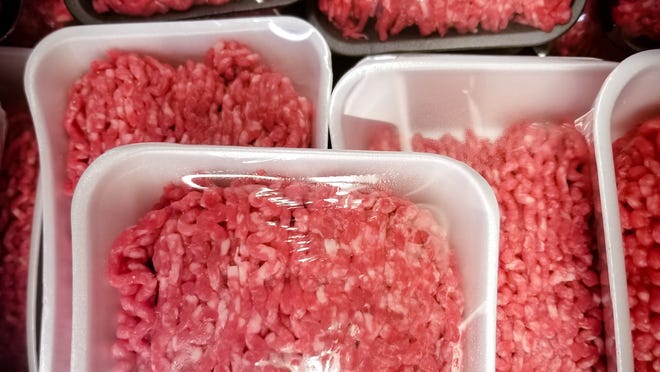School District and Beef and Tompkins
Equally the leaves change this fall and Tompkins County students set to return to the classroom, they may notice a change to the traditional, sometimes underwhelming, scholastic dietary experience — locally sourced, low-antibiotic beef.
Four Tompkins County School districts take awarded beefiness contracts to a supplier that purchases cattle from New York country farms that hold to use practices that reduce on-farm utilize of antibiotics.
The nutrient purchasers at Dryden, Groton, Ithaca and Trumansburg schools will require vendors behest on their beef contracts to meet new specifications that reduce on-subcontract, blanket use of antibiotics.
The plan, which is being called the first of its kind, was adult past The Middle for Agricultural Development & Entrepreneurship forth with Cornell University and Tompkins County schoolhouse officials.

"Nosotros're facing a worldwide public health crisis where antibiotics are becoming ineffective in treating infections because they are overused in both people and animals," said Dr. Ken Jaffe, a CADE lath member and beefiness farmer. "Our goal is to reduce antibiotic use in people and animals without sacrificing well-being, so we can go along these of import medicines effective for treating sick people."
The age of the 'superbug'
Overuse of antibiotics in animals and humans has created a public health crunch. Leaner that are resistant to antibiotics can lead to infections in people that are costly and difficult or sometimes impossible to treat.
Last month, a new World Health Organization study found "alarming levels of resistance accept been reported in countries of all income levels, with the result being that mutual diseases are becoming untreatable, and lifesaving medical procedures riskier to perform."
More:'Nightmare' bacteria, resistant to about every drug, stalk U.Southward. hospitals
Antibiotics are often used for coating treatment of big groups of animals that are at risk of infection. While the FDA has reported declines in the amount of antibiotics used in livestock in recent year, livestock all the same receive 65 pct of the total amount of antibiotics administered to humans and animals in the U.South.
The new policy requires vendors bidding on the school's contracts to work with farmers who employ on-subcontract management practices that lower the risk of infection in cattle. It as well requires them to identify individual animals that are at loftier hazard of infection and treat those animals, instead of treating unabridged herds with antibiotics.
This new guidelines incentivize farmers to go across the antibiotic stewardship currently required nether FDA and USDA regulations by giving smaller, local farms access to contracts with local school districts if they meet the requirements.
A local approach to a global trouble
Slate Foods, a New York City-based food distributor was awarded the first contract of its kind to provide locally sourced beef for the iv Tompkins canton schools nether its Ruby-red Barn Provisions label.
"The effect of overuse of antibiotics in livestock has e'er been at the forefront of our mission when sourcing cattle for schoolhouse meal programs," said Julia Van Loon, president of Slate Foods. "We now purchase cattle from farms committed to treating only those animals at high gamble for infection and not administering coating antibiotics to herds."
"Nosotros applaud Tompkins County for creating a specification that requires prudent antibiotic policies for sourcing beefiness for their farm-to-school lunch program for 2019-20," added Van Loon. "Information technology'south prissy to know that we were awarded the bid and can aid back up their values. It's healthier for people, the planet and animals akin."
In 2016, the New York Country Section of Wellness established an Antimicrobial Resistance Prevention and Control Job Forcefulness, which developed Finish Antibiotic Resistance Roadmap to combat the growing threat of antibiotic resistance. One of its recommendations is reducing the inappropriate use of antibiotics in livestock.
More:How to fight 'scary' superbugs that kill thousands each yr? Cooperation — and a special lather
This new procurement policy aligns public school purchasing with New York land'due south public health policy.
"We are delighted to procure local beefiness from Slate Foods," said Trumansburg Central Schoolhouse District Superintendent Kimberly Bong. "Adding this requirement in our bid and contracting with these vendors demonstrates our commitment to supporting the wellness and wellness of our students."
While iv school districts in the Southern Tier are hardly going to head off a global trouble, the architects of the program promise that they've created a model that can be adopted and practical everywhere — greatly reducing the use of antibiotics and preserving their effectiveness.
"Nosotros'd like to meet school districts throughout New York State — and potentially beyond the nation — replicate the same food buying policy," said CADE executive manager Phoebe Schreiner. "It volition not only accept of import public health implications for our communities, it will also reward beef producers who utilise improved antibiotic practices. For those who don't, it offers a carrot to move in that direction."
Reach Thomas Giery Pudney at 607-274-9205 or on Twitter @tommypudney . Support our journalism and become a subscriber today. Click here for our special offers.
Source: https://www.ithacajournal.com/story/news/local/2019/05/20/how-school-lunch-tompkins-county-help-fight-superbugs/3695640002/
0 Response to "School District and Beef and Tompkins"
Post a Comment